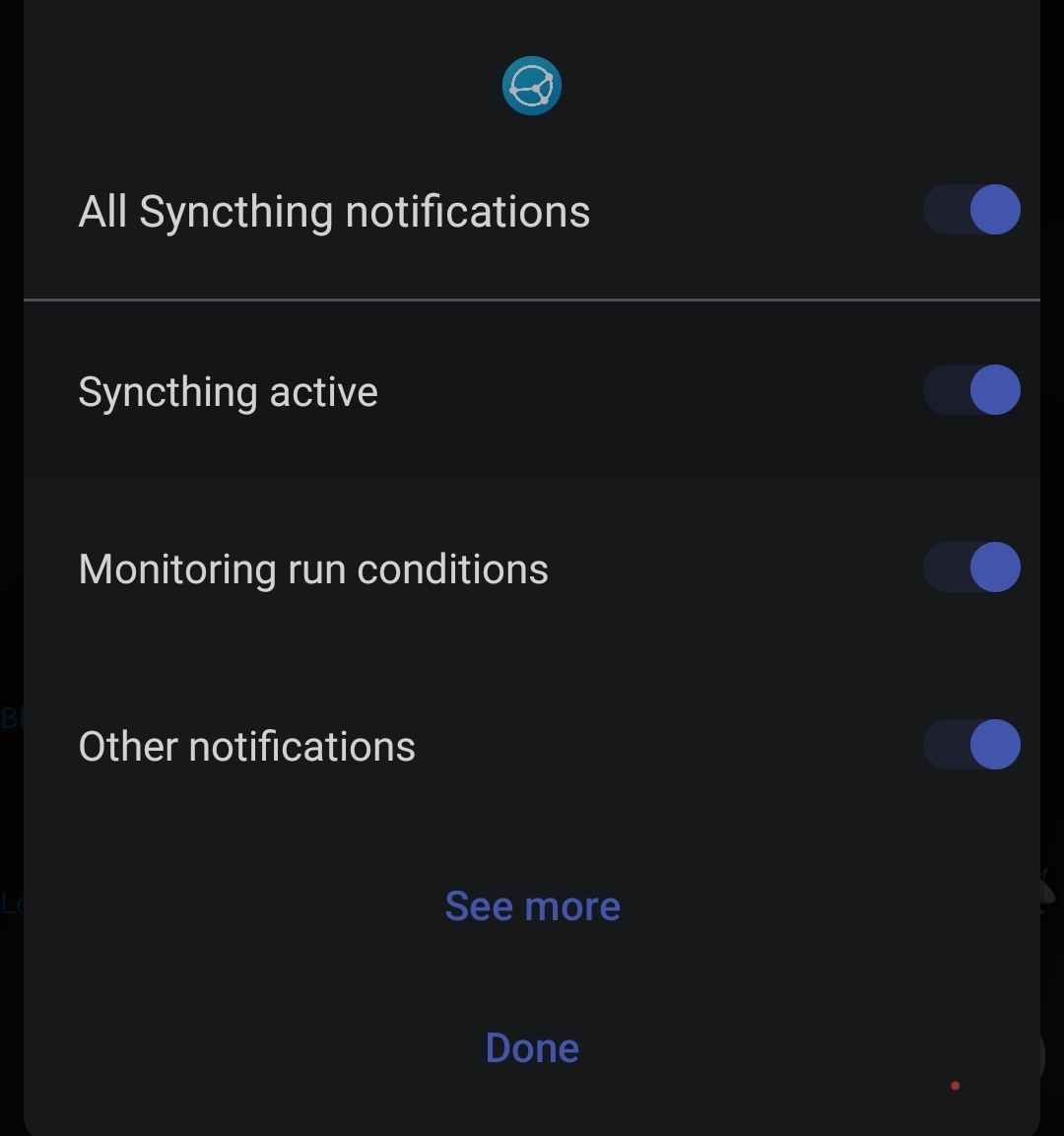Edit: Thanks for all the suggestions. I’m going to try sticking with syncthing and try the fork of the UI and see if that keeps everything working.
–
I want to sync files between my linux PC and Android phones (mostly for Obsidian notes).
Can anyone recommend a good real-time sync?
I’ve been trying syncthing, but despite turning off battery optimization for the app, it rarely sees the phone as connected. I don’t want to have to remember to check syncthing every time I edit a note.
I use resilio for syncing between PCs but it looks like it has a high battery usage on the phone, as if it is frequently polling for changes.
I use FolderSync for occasional scheduled syncs (e.g. updating my MP3s from the server to my phone), but a scheduled sync either is frequent enough to affect battery or it risks sync conflicts.
Cloud services such as OneDrive, Dropbox and Google Drive don’t show up as big battery drains, so I assume that they use change notifications from the OS instead.
Are there any real-time 2-way sync apps for phone that don’t have big battery drain and are not for cloud providers?
I’d really recommend giving Syncthing a second chance, twist a few knobs in the settings until it works. I’ve used it for years with barely a hitch.
Do you use it on a phone too? I did find it tricky to set up (more options than I really need, and the phone app settings don’t really work unless you select “Web UI”, which is really strange), but I didn’t mind the setup if I could then leave it alone and it works. Ideally I want to set this up on other family phones, so I can update notes and they appear everywhere.
I prefer Syncthing-fork for some more straightforward configuration. Mainly the three button options equating to “follow the run conditions, damnit”, “run damnit”, and “stop damnit”
Thanks. I’m giving that a try!
I keep multiple phones in sync, with hundreds of gigs synced every day.
Have you found a way to get rid of the notification and keep Syncthing running in background?
Just hide it in your OS notification settings
But in this way I don’t get any notification if something goes wrong

I think any issues would show in “other”
Daaaaamn, was that so easy to just disable “Syncthing active”?
Let’s try! Thanks
For me that can be more specific. If I select the offending notification (either in the settings for notifications history or directly in the notification area) I can disable that specific type of notification. For instance deals from Amazon or eBay or something like connection established from tailscale.
Are you sure that there are different type of notification for Syncthing? Have you disable the persistent one and still received a failed sync one (or something else)?
It’s the main way I sync my phone.
I have a different app for photos, but SyncThing on my phone, and on my desktop, and again on one of my home servers, do most of the download and data syncing.
Occasionally I’ll have to manually run SyncThing; I’m not certain that Android is reliably starting it after reboots, but for the most part it just does it’s thing really reliably. There is a lag; it can take a few minutes for changes to sync - it’s not immediate. For me, this isn’t a problem, and I’d rather that than a battery suck, so I haven’t messed with it.
I could live with a few minutes, but it’s showig as offline for days. Maybe it is failing after a reboot. At least that would be a known situation to watch for.
In my experience syncthing is always a bit like that using the default discovery settings.
I use a hub & spoke set up now. Instead of A, B, and C all connecting to each other directly, they only connect to D. I also input the address for D specifically instead of using discovery servers.
With this set up I’ve never had any drama.
Honestly, I think Android is fucked for debugging stuff like this. I installed a program on mine and my wife’s phones - different makes & models - and configured them exactly the same, including the app settings in the OS. Mine works perfectly and barely shows up in battery use, near the bottom. Her’s drains her battery even when she’s not using it, regularly running at 50% of total battery consumption.
With Android YMMV is the rule, rather than the exception. There’s just too many variables.
Yeah, phone to laptop, and I recently synced all backups and files from an old phone to a new one, too. Once you have the computer setup, you can basically connect phones by reading its QR code.
If the official Syncthing Android app is giving you a hard time, maybe try Syncthing-fork? IIRC that’s only the daemon and web GUI wrapped as an app. But I’ve used the main app only for the past few years.
I have the phones connected, but the app just decides to disconnect and stay that way until I check it. I’ll give that fork a try, thanks!
Perhaps your phone has extra aggressive battery saving settings that kill the background process? The official Syncthing has a setting to run as a persistent service, which always helped me.
Otherwise see if you can make system exceptions for the app to run in the background, and allow it to auto-sync. It’s been a while since I used the forked app, buy it did help me out on a device where the official didn’t work for me.
Hope this helps.
Fork works much better on Android, largely because it moves sync conditions into the individual sync jobs (what ST calls folders).
I use LocalSend between all my devices (work, personal, etc). Mac, Linux, Android, Winblows. All. It’s fast, effective, lightweight. FOSS.
I was recently looking for something like this and couldn’t find what i was looking for, so thanks!
If this is mostly for Obsidian, use the community plugin and a self hosted CouchDB.
https://github.com/vrtmrz/obsidian-livesync
I’ve found it quite good.
I’ve been trying syncthing,
It’s what i use but on the phone i only turn it on when i want to sync, otherwise it might drain battery. Always running on the PC.
Mega also works.
Looks like you already settled on this, but I’m doing exactly this (syncing obsidian, as well as photos/videos from camera reel), to desktop and NAS, using syncthing-fork. Let me know if you want some pointers.
2 more cents :)
I’ve been using syncthing for a while now, on different devices, and the only unreliability I’ve run into is with android killing syncthing to save battery life, which is kinda hilarious, considering all the vendor- and google-provided crap they happily waste battery on (I don’t use it, but for what I’ve heard iOS is even worse in this regard).
Specifically, I have a samsung tablet where, no matter how much I tinkered with system settings, synchthing would only run if I manually launched the app or while the tablet was charging (BTW I still use that same tablet, but it now runs LineageOS and syncthing works flawlessly).
All this is to say, you should probably look into system settings and research ways to convince your OS to do what it’s supposed to rather than tinkering with syncthing itself.
KDE connect!
Interesting, I’d not heard of that. But does it auto-sync files? It mentions the clipboard, sharing links and browsing remote directories, but I don’t see a file sync mentioned.
I didn’t see the file sync part.for that I use next cloud.which works great but my he overkill if that’s all your going to use it for
I use Nextcloud. I run it in Yunohost.
Resilio sync is outstanding
It’s free for personal use, but the license process is annoying (email)
I’d like to use resilio, I even bought a license to support it as I use it for all my pc syncing. But it’s currently showing 41% battery use for today on my phone for 2 minutes screen time 11.5 hours background. Lenny Voyager shows 7% for 1.5 hour screen time. So something is not good with the phone app. Maybe the Android battery info display is misleading somehow (it confuses me because it shows a percentage of the time-interval you’re viewing, not a percentage of the total battery drain(.
Yea, I like Resilio, but it’s a battery and ram hog.
Syncthing should work fine for you.
Does your phone have some custom battery management? Some vendors do that, and it causes issues.
The only setting I see is “allow background usage”, which is on (I’m using it on a Pixel 7 and 8).
Pixel is clean, from a battery saver perspective, so that’s probably not your issue.
Not sure what to do next. I’ve used it for about 10 years now, and keep gobs of stuff in sync with it.
I do recommend Syncthing-Fork for Android, it moves the sync conditions into the individual since folders, so you get finer control.
Do you get any errors on the desktop console? On Android, if you launch the web client you get much more info and configuration capability (Menu - Web GUI). Once there, click the gear at the top right, and open Logs. Maybe there’s something there that can help.
I’m trying the fork now, thanks. So far, it’s behaving. Thanks for the pointer to the logs, I’ll take a look if it happens again.
I’ve used Sycthing but it was somewhat finicky.





